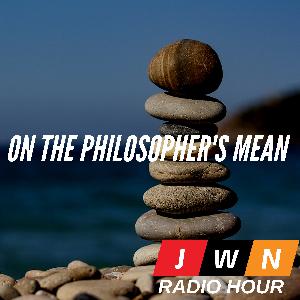Discover WIN Radio Hour
WIN Radio Hour

WIN Radio Hour
Author: Jacob Laguerre
Subscribed: 13Played: 64Subscribe
Share
© Jacob Laguerre
Description
WIN Radio Hour (fka JWN Radio Hour) is a weekly audio program presented by Writtenhouse and executive produced by Jacob Laguerre. We share practical strategies, concepts and tools for your life and business in the form of audiobooks, spoken word, interviews and more. Support this podcast: https://podcasters.spotify.com/pod/show/winradiohour/support
30 Episodes
Reverse
In today's episode, we bring you the full-length audiobook of Enchiridion by Epictetus.
Epictetus is ranked as one of the "Big Three" of Stoic philosophy, alongside Seneca The Younger, and Marcus Aurelius (my personal favorite).
Although no known writings of Epictetus has survived, we do have his teachings distilled in the form of two books written by Arrian, a student of Epictetus.
I've personally listened to this audiobook many times myself and I hope that you get value from this as well.
---
Support this podcast: https://podcasters.spotify.com/pod/show/winradiohour/support
Do you know what is the highest duty and the highest proof wisdom? It is when your words and actions are in harmony with one another. Very few people manage to achieve this and even fewer manage to do it consistently. Many people tend to bounce from one thing to the next, and their instability leads to their downfall.
---
Support this podcast: https://podcasters.spotify.com/pod/show/winradiohour/support
"There's thunder even on the loftiest peaks," said Maecenas. Seneca quoted this line to Lucilius to make a point that even the highest stations like government positions come with their own share of troubles. For this reason, he urges Lucilius to retreat from public life and reclaim his time. He plays the part of Lucilius by asking "How can I take my leave?" Seneca responds by saying, "Anyway you please".
---
Support this podcast: https://podcasters.spotify.com/pod/show/winradiohour/support
When everyone is in a festive mood, it could seem natural join in on the fun. Or, you might decide to distance yourself away from it entirely. Seneca believes that "one can keep holiday without extragavance." As a challenge to Lucilius, he tells him to set aside a certain number of days where he will test himself by living far below his means as a way to fortify himself against poverty. He tells him, "If you would not have a man flinch when the crisis comes, train him before it comes".
---
Support this podcast: https://podcasters.spotify.com/pod/show/winradiohour/support
Most people would rather devote themselves towards attaining riches than attaining wisdom. To attain wisdom is to live according to Nature, and Nature demands very little from us. Even if you wish to acquire something to live on, you can study wisdom while you are acquiring it.
---
Support this podcast: https://podcasters.spotify.com/pod/show/winradiohour/support
Seneca equates studying philosophy with "being well". Without philosophy, the mind is exposed to all types of negative influences and loses its center. While it's true a strong body cannot make up for a weak mind, it is still necessary to exercist the body to some degree.
---
Support this podcast: https://podcasters.spotify.com/pod/show/winradiohour/support
We live in an uncertain world, but Seneca believes we can protect ourselves from most troubles by taking refuge in philosophy. While it is true that there are philosophers like Cato who fought valiantly against a supposed threat, there are a great many others who withdrew from public life for the purpose of improving the human race.
---
Support this podcast: https://podcasters.spotify.com/pod/show/winradiohour/support
Seneca famously says to Lucilius that "we suffer more often in imagination than reality." In other words, most of what we fear is completely unfounded. We allow ourselves to get worked up over something that most likely won't happen. In any case, we should prepare ourselves not only for the best but expect the worst. From there, there's nothing that could catch us by surprise because we have already accepted both extremes.
---
Support this podcast: https://podcasters.spotify.com/pod/show/winradiohour/support
Seneca is reminded of his advancing years when he visits his old country-place. He sees a tree that he planted with his own hands begin to wither and die, even while under constant care. Life is better enjoyed when we are nearing the end, but it would be wise for all of us to treat each day as if it were our last.
---
Support this podcast: https://podcasters.spotify.com/pod/show/winradiohour/support
There are some things that wisdom can remove from us, like unruly passions and fears, and there are others that stay with us no matter how advanced we are in attaining. The blush is one of those things and it arises in both old and young people alike. Seneca tells Lucilius that "Whatever is assigned to us by the terms of our birth and the blend in our constitutions, will stick with us, no matter how hard or how long the soul may have tried to master itself. "
---
Support this podcast: https://podcasters.spotify.com/pod/show/winradiohour/support
Seneca tells Lucilius to "avoid the many, avoid the few, avoid even the individual." He believes that only thoughtful people can be trusted with themselves, while the majority of people would find themselves in dangerous company if they were left alone. He further instructs him to call boldly upon God for a sound mind, and then body. Both of them are things which do not belong to another.
---
Support this podcast: https://podcasters.spotify.com/pod/show/winradiohour/support
In today's episode, we're bringing you Letter 9 - On Philosophy & Friendship, from Moral Letters to Lucilius. Seneca eloquently explains the difference between the wise man according to Stoics, from the wise man according to the Epicureans. According to the Stoics, the wise man is self-sufficient with or without friends but has a natural desire for them. The Stoic's wise man seeks friendship because it is a good in itself while Epicurean's wise man see friends as a means to an end.
---
Support this podcast: https://podcasters.spotify.com/pod/show/winradiohour/support
In today's episode, we're bringing you Letter 8 from Moral Letters to Lucilius. In this letter, Seneca explains to Lucilius why he encourages him to leave his public affairs and retreat into himself. Seneca admits that it had taken himself a while to find the "right" path and now in his old age, he encourages others to follow the path he found later in life.
---
Support this podcast: https://podcasters.spotify.com/pod/show/winradiohour/support
In today's episode, we bring you Letter 7, On Crowds, from Moral Letters to Lucilius by Seneca. According to Seneca, if there's one thing to be avoided, it would be large gatherings of people, better known as crowds. He even believes that those with supreme moral integrity like Socrates or Cato would succumb to a crowd that was unlike them. Instead of hanging with the crowd, Seneca advises Lucilius to find someone whom he can improve as well as those who can help improve him.
---
Support this podcast: https://podcasters.spotify.com/pod/show/winradiohour/support
In today's episode, we bring you Letter 6 from Moral Letters to Lucilius from Seneca. In this letter, Seneca stresses the importance of sharing knowledge with others. All men are born into this world and are destined to die. During our time on Earth, we will face similar problems which can be circumvented through the use of wisdom. And it is within our power to share our wisdom with others and help the world towards a better path.
---
Support this podcast: https://podcasters.spotify.com/pod/show/winradiohour/support
In today's episode, we're bringing you Letter 5 - On The Philosopher's Mean, from Moral Letters to Lucilius by Seneca. Seneca instructs Lucilius that he should find a happy medium between being one of the people and being a sage. An ideal philosopher lies between these two extremes where they retain the common touch but people can still admire him for the kind of character that he has.
---
Support this podcast: https://podcasters.spotify.com/pod/show/winradiohour/support
In today's episode, we bring you Letter 4 - On The Terrors of Death, from Moral Letters to Lucilius. In this letter, Seneca instructs Lucilius on the importance of scorning Death if one wishes to live a tranquil and peaceful life. This is highlighted by him saying, "No man can have a peaceful life who thinks too much about lengthening it, or believes that living through many consulships is a great blessing". Living for a long time isn't always a blessing, and dying before expected isn't necessarily a bad thing either.
---
Support this podcast: https://podcasters.spotify.com/pod/show/winradiohour/support
In today's episode, we bring you Letter 3 from Moral Letters to Lucilius by Seneca. In this letter, Seneca explains what a true friend is and what it entails. In a nutshell, a true friend is someone that accepts you for who you are and is willing to be there for you even when it's not favorable to do so. A false friend is a friend for personal gain and will abandon you at the first sign of trouble.
---
Support this podcast: https://podcasters.spotify.com/pod/show/winradiohour/support
In today's episode, we will be listening to Letter 2 from Moral Letters to Lucilius. In this letter, Seneca instructs Lucilius on the importance of reading a few select authors, rather than reading a large and varied amount. He even goes so far to say that the reading of many books is a distraction and it does us more harm than good to be acquainted with many authors over thoroughly digesting just a handful of them.
---
Support this podcast: https://podcasters.spotify.com/pod/show/winradiohour/support
In today's episode of JWN Radio Hour, we have Letter 1 from Moral Letters to Lucilius by Seneca. In this letter, Seneca stresses the importance of time and how we waste most of it without even realizing it. When you stop to think about it, time is the only thing that we actually possess. Everything else can and will get taken from us.
---
Support this podcast: https://podcasters.spotify.com/pod/show/winradiohour/support
























